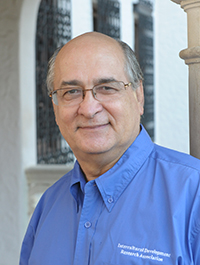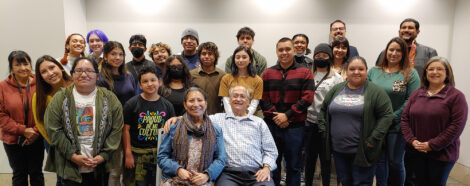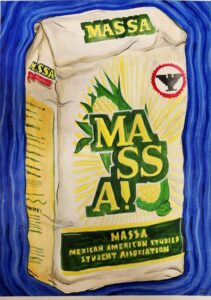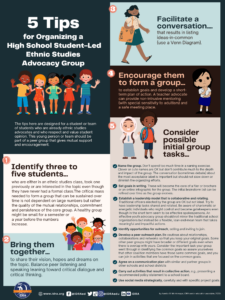• By Aurelio M. Montemayor, M.Ed. • IDRA Newsletter • March 2023 • 

In a climate where the clouds of gloom and doom for diversity, equity and multicultural instruction shade debate about education, teachers and students are shining with rays of advocacy and valuing for ethnic studies. For example, in San Antonio area schools, supporters of Mexican American Studies (MAS) have formed a community of practice that nurtures educator and student leadership.
When the Texas State Board of Education approved a MAS elective high school course several years ago, school districts began to offer the class. An informal survey of schools that offer the course showed that a significant number responding that the class did not “make” for one of two reasons: no teacher could be found to teach it, or students did not enroll.
In 2017, several ethnic studies advocates met informally to assess the status of Mexican American Studies in the area. About half of the 13 school districts in Bexar County offered the course and had the teachers to teach it but were challenged with student enrollment, often due to a lack of student and family knowledge of the course or to scheduling issues. This MAS group I am a part of began to organize the community of practice to bring together educators who were either teaching MAS or wanted to. Experienced teachers shared their materials, approaches and activities. They also designed packages for newbies who are interested in teaching ethnic studies classes.
Participants found that lacking a traditional textbook is not an obstacle thanks to the constantly increasing availability and accessibility of online digital resources, such as IDRA’s School Resource Hub – We All Belong (https://idraseen.org/hub). In fact, the textbook void has virtually (pun intended) accelerated creativity and flexibility in how ethnic studies courses can be taught. This increases student interest and even co-participation in creating the curriculum and informing the instruction.
Educator Communities of Practice

Communities of practice such as this are powerful for several reasons.
Sharing Best Practices: Teachers of ethnic studies can come together to share best practices, resources and teaching strategies.
Building Community: Isolated teachers may feel disconnected from a larger community of educators who are similarly passionate about teaching MAS. Building a sense of community and support can help to reduce burnout and improve job satisfaction.
Advancing the Field: Participation can encourage new and innovative ideas about how to advance the field, leading to development of new curricular materials, teaching strategies and research.
Advocacy: Communities of practice can create a powerful advocacy network to promote the importance of teaching MAS and advocate for its inclusion in school curricula. This can help to increase awareness and support for MAS among students, parents, administrators and policymakers.
Empowerment: Participants can feel empowered as educators to take a more active role in advocating ethnic studies.
Students Take the Lead
After several meetings, now called Cafecito y MAS (a play on the word for more in Spanish and the acronym for the course), youth participation became an added focus for us.
First, we included high school and college students as participants. The sessions that followed were then led and facilitated by high school students who were either in a MAS class, had been in one or wanted to take it but their school did not offer it.
For example, at one meeting, a high school senior served as emcee. After a warm-up where table participants shared why they value MAS, a panel of six students gave brief presentations on the value of MAS and what needs to be done to advocate it.


Another team of students who do not have access to a MAS course conducted a survey of over 100 students and some teachers. The results showed overwhelming support for the course. The principal put the course back on the schedule for the next fall, and the surveying students were able to recruit 30 students to register for it.
Students and parents also presented testimony on the value, relevance and importance of ethnic studies. Student creativity blossoms in fliers and posters celebrating MAS. They held banners as they marched at the annual César Chavez Memorial Parade.
We used a set of key approaches to foster such student participation and leadership in advocating ethnic studies.
Curriculum Development: Ensure that the curriculum accurately reflects and represents Mexican American history, culture and contributions. Including diverse perspectives and voices in the curriculum also can help students feel seen and valued.
Culturally Responsive Teaching: Adopt a teaching style that acknowledges and values the culture and experiences of students. Creating a safe and inclusive classroom environment helps students feel comfortable and supported.
Community Engagement: Encourage students to engage with their local Mexican American community and to participate in cultural events and celebrations. This helps students feel connected to their community and develop a sense of pride in their cultural heritage.
Mentoring and Role Models: Provide students with access to Mexican American mentors and role models. This can be encouraging student support for MAS and helps students see themselves represented in leadership positions and inspire them to pursue their own goals.
Extracurricular Activities: Provide opportunities for students to participate in extracurricular activities related to MAS, such as clubs and volunteering. This can help students develop a deeper understanding and appreciation of Mexican American culture and history.
Family Engagement: Involve family members in the educational process to support student success and engagement. This can include parent-teacher conferences, family nights, guest speakers from the community and other opportunities for family involvement.
Supportive Resources: Give students resources and support systems, such as tutoring, counseling and mentorship programs to support their academic success and well-being. These resources help ensure students feel supported and valued within the school community.
Our community of practice continues to support itself by strengthening peer connections, inviting other educators to join the cause, and encouraging student leadership.
These strategies naturally work for any type of ethnic studies course. I encourage any community to create such a powerful educator and community network. Student voices and actions might be the strongest influence on education policy and practice.
The spring of MAS/mass content.
Read What Young People Have to Say About Ethnic Studies
IDRA is pleased to share these stories in the IDRA Newsletter.
- The Day I Taught My High School Peers, by Alyssa Diaz, August 2019
- We Are Important, and So is Our History, testimony by Quardasha Mitchell, June-July 2020
- Maybe One Day, the Pain Won’t Feel the Same, testimony by Earl Williams, June-July 2020
- Mexican American Studies is American History by Josué Peralta de Jesús, October 2022
- Remove Obstacles to Ethnic Studies for Georgia Students, by Ruth Youn, February 2023
Aurelio M. Montemayor, M.Ed., is IDRA’s family engagement coordinator and directs IDRA Education CAFE work. Comments and questions may be directed to him via email at aurelio.montemayor@idra.org.
[©2023, IDRA. This article originally appeared in the March 2023 IDRA Newsletter by the Intercultural Development Research Association. Permission to reproduce this article is granted provided the article is reprinted in its entirety and proper credit is given to IDRA and the author.]



